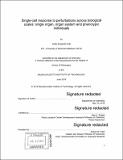Single-cell response to perturbations across biological scales : single organ, organ system and phenotypic individuals
Author(s)
Kolb, Kellie Elizabeth.
Download1130059587-MIT.pdf (16.83Mb)
Other Contributors
Massachusetts Institute of Technology. Department of Chemistry.
Advisor
Alex K. Shalek.
Terms of use
Metadata
Show full item recordAbstract
The biological processes that sustain a complex organism require the orchestrated dynamics of complex cellular ensembles. Several vital systems - such as the immune system, the digestive system and more - must process internal and external signals to maintain functional homeostasis in response to perturbations at the systems-level. To further understand how groups of cells collectively respond to perturbations, we have applied single-cell RNA-sequencing and complementary techniques to explore cellular behaviors within complex systems at multiple relevant biological scales: from within a single organ, to an organ system, to across several human individuals with differing genetic backgrounds linked by a shared phenotype. More specifically, at the level of the organ, we have explored acute injury responses in the liver. We have identified and described a new compensatory phase of the liver response to injury, in which surviving hepatocytes upregulate their expression of critical liver function genes to maintain overall organ function. Next, we extended our approach from a focus on an acute injury targeting a single organ to exploring chronic damage resulting from a long-term high fat diet across multiple gastrointestinal and immune compartments. Our analysis revealed molecular pathways and changes in stem gene expression which may contribute to obesity-related disease. Finally, we characterized shared features across multiple unique human donors with a common phenotype, elite control of HIV-1. We identified and validated a subset of highly functional dendritic cells, and developed broadly applicable computational approaches to identify reproducible responses across donors and to nominate candidate targets for rationally modulating the system. Overall, our work demonstrates the utility of single-cell RNA-sequencing for uncovering important cellular phenotypes that inform systems-level responses at any biological scale.
Description
Thesis: Ph. D., Massachusetts Institute of Technology, Department of Chemistry, 2019 Cataloged from PDF version of thesis. Includes bibliographical references.
Date issued
2019Department
Massachusetts Institute of Technology. Department of ChemistryPublisher
Massachusetts Institute of Technology
Keywords
Chemistry.